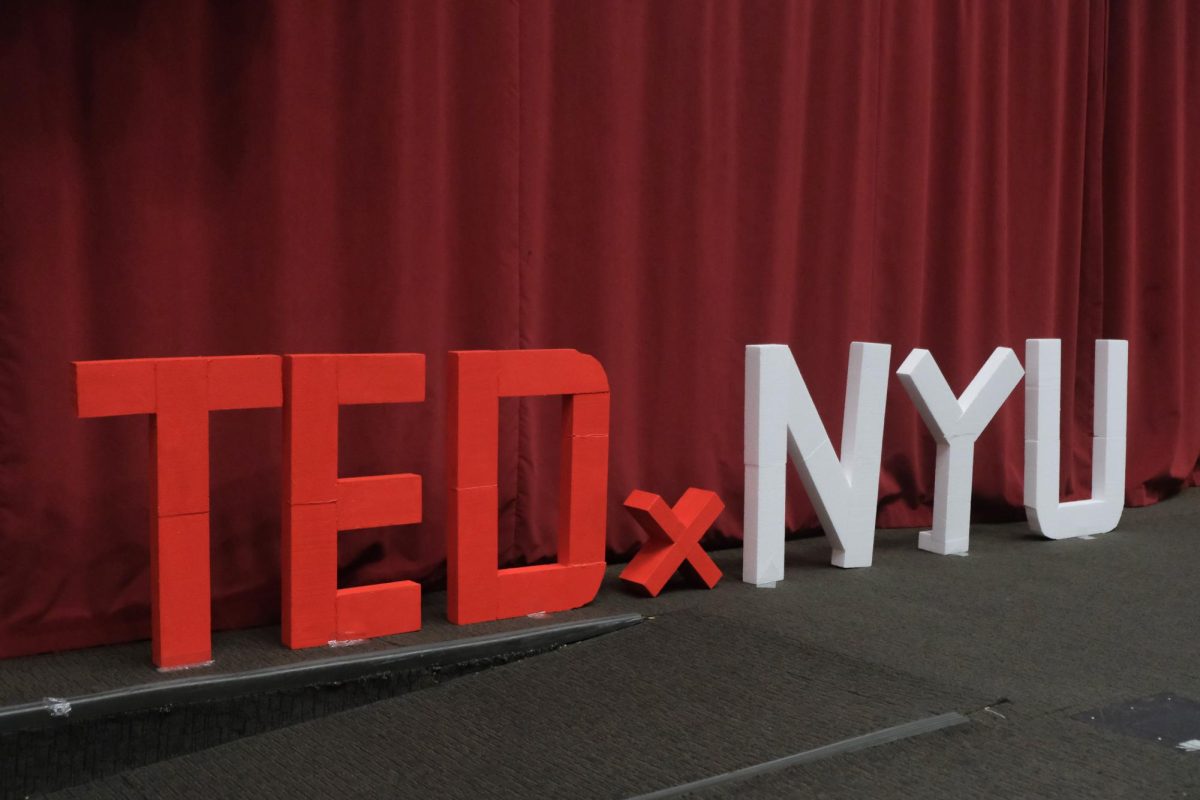On Thursday, anticipation filled a packed lecture hall at NYU’s Global Center for Academic and Spiritual Life. Under spotlight beams, a seemingly incongruous figure took the stage: CAS first-year Suborno Isaac Bari, the youngest student in NYU’s nearly 200-year history.
Bari, 13, was one of four speakers at this year’s TEDxNYU conference, along with CAS junior Saranna Zhang, NYU Abu Dhabi artist-in-residence Sam Nester and NYU Tisch assistant teacher Annaporva Green. The conference’s theme, “MOSAIC,” encouraged a celebration of identity in all its layered complexity — in their talks, each speaker challenged the notion of one-dimensional personhood in their own ways.
Born in the Bronx, Bari is on track to graduate in spring 2027 with a bachelor’s degree in Mathematics and a minor in Physics. He is also currently applying to Ph.D. programs and conducting research on the irrationality of the Riemann zeta function with a mathematician at Radboud University in the Netherlands. But when Bari stood in front of a packed room of around 250 students, faculty and guests, it wasn’t the formulas or the accolades he focused on — instead, he challenged the very idea of what it means to be a prodigy.
“I’m supposed to be explaining the intuition behind the Taylor series for sine of x — you know, you start with x, subtract x cubed over three … and so on and so forth,” Bari said in his talk. “But I’m not talking about that. I’m talking about free will.”
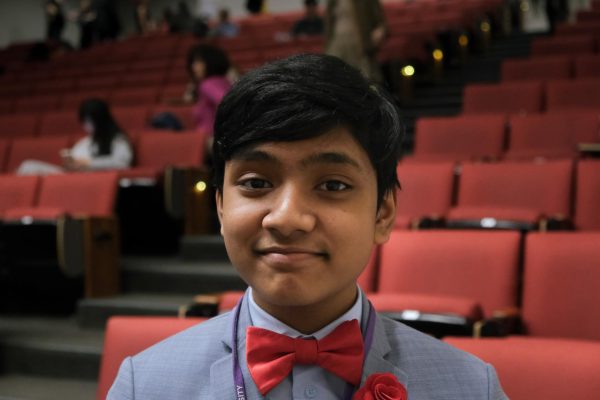
At age seven, Bari was a physics lecturer at Mumbai University. At age 10, he became the youngest qualifier in the history of the U.S. Math Olympiad’s American Invitational Mathematics Examination. A year later, he became the youngest perfect scorer on the AP Calculus BC exam. However, Bari didn’t want his TED Talk to focus on his resume.
“Child prodigies are kind of treated like Superman,” he said. “I’m not Superman. I don’t slash down a bunch of math problems and go to sleep, the same way Superman seems to slash down a bunch of villains and fall into a vegetative state until the next one arrives.”
Bari spoke about a larger cultural tendency to flatten remarkable individuals into caricatures, expecting them to embody only their most marketable trait. He recounted an instance when he was set to be featured on NBC at age seven, and was told by the crew to come up with a response about having a unique perspective on life.
“None of your child prodigy shows … are ready to approach that being a math prodigy shouldn’t be the defining part of your identity,” Bari said. “It should be one of the things you know for sure, but it shouldn’t be the only thing that people know you for.”
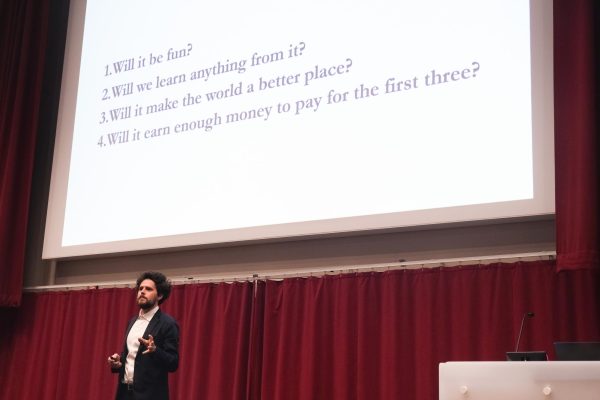
This theme of rejecting one-dimensional categorization was present in all four of the conference’s talks. Sound artist Sam Nester, for example, opened the evening with his own plea against limiting self-definition.
“I don’t think it’s enough to be a scientist or a musician or a baker,” Nester told the audience. “What matters is that we are the most actualized versions of ourselves, armed with knowledge and skills of our discipline, but willing to apply them in unexpected ways.”
Nester’s projects include transforming biological data and genetic code into soundscapes and visualizations. In his talk, he advocated for cross-disciplinary collaboration and said that “the best ideas don’t come from individuals, but from the spaces between them.”
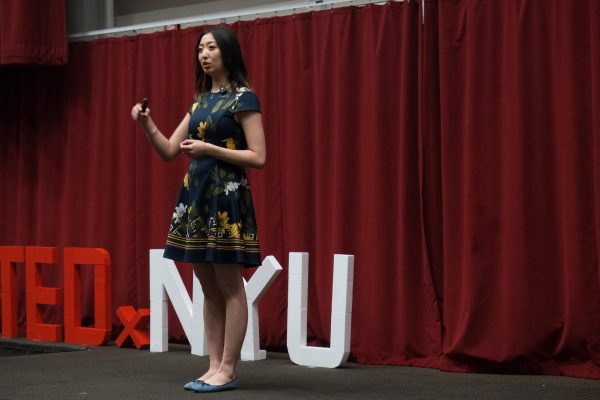
For Saranna Zhang, an NYU junior studying international relations and journalism, the journey towards self-definition began with an email address that cataloged her childhood pursuits: [email protected]. Zhang described how her identity was so thoroughly entwined with her extracurriculars — ballet, swimming and piano — that deciding not to pursue the arts professionally after attending a prestigious performing arts high school led her to question who she was beyond her activities.
“If I wasn’t a dancer, a swimmer or a pianist, what would I be left with?” Zhang said in her talk. Her answer came through public service, particularly advocating for gender equity and reproductive rights in her home state of Texas. When Zhang was in high school, she testified before the state legislature regarding the state’s “tampon tax” on menstrual products.
“Defining myself by determining what I want to do by helping other people has been not only deeply uplifting and fulfilling, but has helped me learn who I am and who I want to become,” she said.
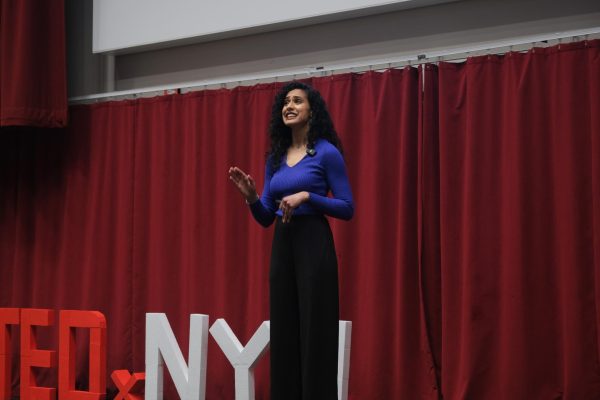
Multidisciplinary theater artist Annaporva Green ended the conference with insights from her work as an intimacy coordinator. Using exercises like “the handshake game” — where participants choose whether to extend a hand for a handshake after making eye contact — Green illustrated how consent and communication can create safety in vulnerable moments.
“The foundation of this work is built upon the dynamics of consent,” Green said. “Even with a handshake, we make a choice of saying ‘yes’ or ‘no,’ and that is an act of consent within itself.”
At the end of Bari’s talk, he brought out a physical cardboard box, throwing it into the air and kicking it aside — what he described as a “humble request” for society to stop boxing him into a specific identity. The gesture brought resounding applause from the audience.
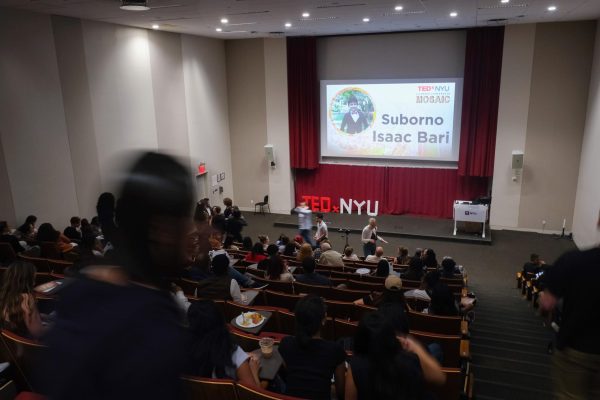
“It feels like my public persona is way more perfect than I am,” Bari told WSN before the conference. “So [my talk will] probably enable me to finally stop feeling like an imposter.”
From Nester’s interdisciplinary pursuits to Zhang’s activism, each presenter demonstrated different manifestations of a universal struggle: the battle against reductive categorization — arguing, in their own ways, that human identity is inherently complex, layered and resistant to easy labeling.
“We refuse to see the incomprehensible complexity in each other,” Bari said. “We refuse to understand that other people are just as human and just as incomprehensibly complex as us. If you had to spend your whole life studying one person, you still wouldn’t know them as well as they know themselves.”
Contact Daphne Zhu at [email protected].
























































































































































